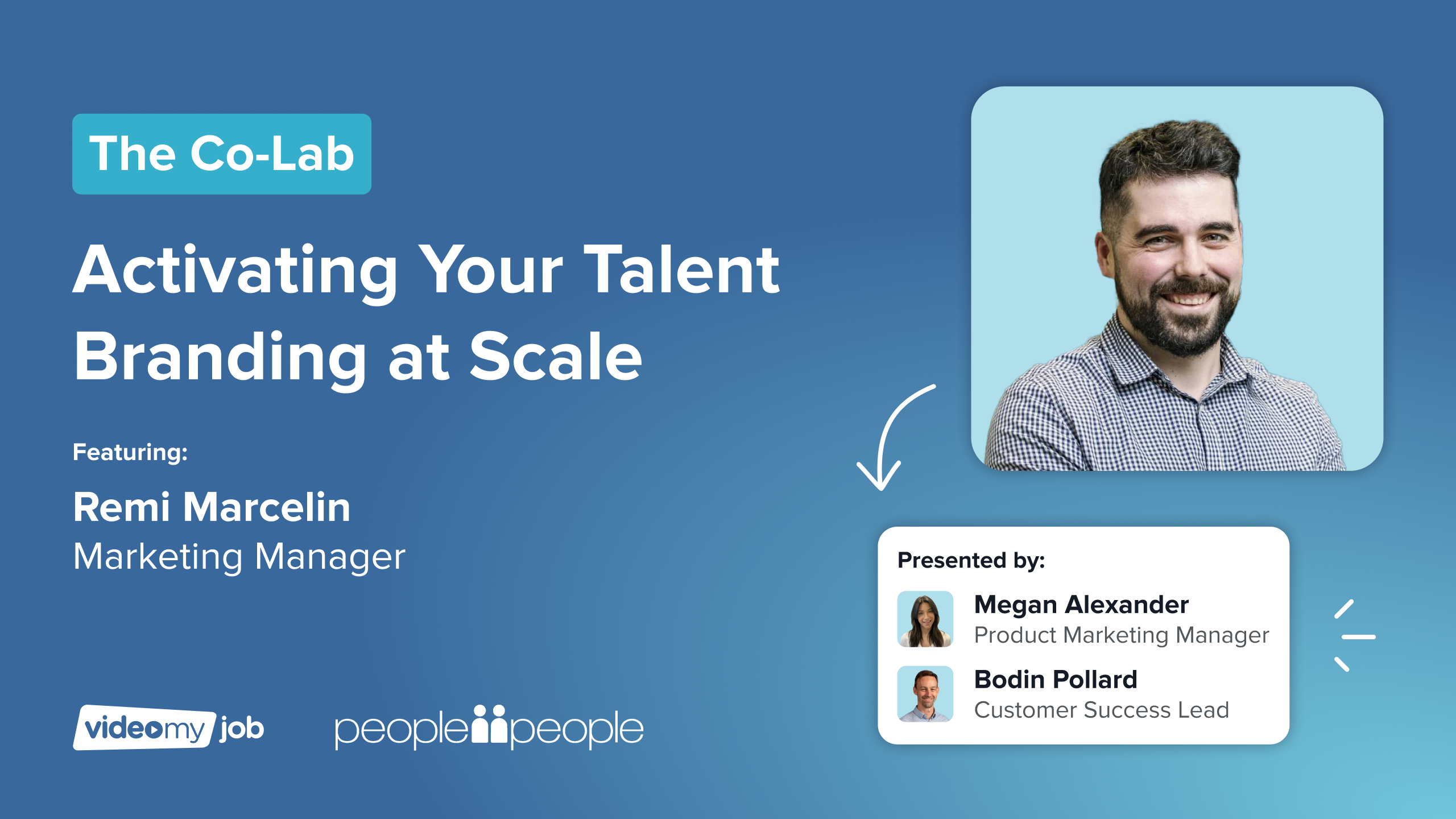We had such an insightful chat with Remi Marcelin from people2people on The Co-Lab Live in December 2023. Remi is a data driven Marketing Manager leading a global team across Australia and New Zealand, with experience expanding across marketing, communications, social media and HR.
The team at people2people have been using VideoMyJob for over 7 years, and you can read the Q&A interview below, or watch the full episode here.
Q: Remi, can you start by telling us a little bit about your role and your team?
Yes, I’m the Marketing Manager at people2people.
People2people is a recruitment agency with a team of 130 people, spread out across Australia, New Zealand and the United Kingdom.
As the Marketing Manager at people2people in Australia and the UK, and Frog Recruitment in New Zealand, part of my role is to promote the use of video across the business, and ensure our recruitment consultants remain active on socials, to help them extend their networks and promote their personal brand.
Q: What made you explore a video solution and what led to the implementation of VideoMyJob?
Hmm I have three key reasons that immediately come to mind.
First, with the rise of social media in the past 15 years, making sure we promote our employer brand has become essential to remain competitive in our industry. With videos, you are able to showcase your team’s culture, your office, the vibe in the office, and it’s not just words anymore. You can visually showcase how it feels to work for a company, which I believe is much more powerful than simply stating it in a job ad.
So instead of people having to read it, you can show who you are and what you are doing and how you're doing it using video. And I think people resonate way more with this as it's just much more powerful than just words at the end of the day.
With this comes the second reason: talent attraction. While having a great job description can help attract talent and get them to apply for a role, videos truly provide another level of insights as I just mentioned. We all know the recruitment process can be costly: it will take your team time to find candidates, interview them, get the job offer through, while possibly having your team working with one less team member in the background. By adding a video on your job ad, you are likely to boost your application numbers, and give yourself a better chance to find the perfect candidate for your role in a shorter period of time.
Finally, recruitment is now all about personal brand, and all recruiters should work on building a strong network of professionals they can reach out to when looking for candidates. While posting blogs and pictures are a good first step to remain active on socials, again videos give this extra level of insights into who you are and why your network should work with you, which can really help you expand your talent pools.
Q: Great... Remi can you tell us specifically how you and your team are using the VideoMyJob platform, and the use cases you're solving for?
Yes, so our most common use of VideoMyJob is for our job ads. Internally, we promote the use of VideoMyJob to ensure we give ourselves the best chance to attract top talent in Australia, New Zealand and the UK by adding a video to every single job ad. And we use videos on job ads specifically because we know that videos help to boost application numbers by, I think it's about 30%.
We also use VideoMyJob to promote our expertise. A good example of this would be one of our Sydney Team Leaders Aiden Boast, who has for the past 3 or 4 years done a video every week highlighting a key tip to nail your job search. When I talked to him the other day, he said that part of his success and part of the reason his network has grown so much is because he's putting himself out there, and showing his best self and expertise through video.
Another thing we use video for is to showcase that at people2people we don't just do recruitment. We also try to provide added value to our customers, so for example our recruiter will do a market report, and do it using video. I think today on social media, we are bombarded by a lot of things, and videos are the best way to grab people's attention. So just making sure you use video for the key initiatives for your company will really help to promote yourself as a recruiter and promote your personal brand
We also use it to promote our company initiatives. We organise yearly events across our office, and VideoMyJob is the perfect tool to promote them. From a marketing perspective, being able to add the branding to our videos is amazing in terms of brand awareness.
Finally, we use an extra VideoMyJob feature on our website: the VideoMyJob Story Feed.
So the Story Feed is a widget that you can put on some of the pages of your website, but typically on your Careers page on your website. And through this widget, people will be able to explore multiple videos on different themes and topics, such as diversity, well being, your company, culture, etc as a way to help people who are at least considering applying for one of your roles, figure out what its like to work for your company or figure out what your people are like.
So when people visit our career pages, they will be able to access about 50 videos showcasing the different aspects of our company culture. This has really helped us elevate our own talent attraction, and has definitely been a must-have when using VideoMyJob.
Q: Well it sounds like you guys are really using video across various use cases. Like, I love that your team are doing it for every single job ad. It really sounds like your people are using the platform to also elevate their personal brand, which in turn talks to the expertise of people2people as well. Plus you're using it for internal and external comms.
But what I really wanted to touch on is your Story Feed... Remi, can you tell us what was the problem you were trying to solve when you tapped into that initiative?
Yeah, I think there were a couple of problems. I mean, I think VideoMyJob is great, but at the end of the day it really does depend on who is on that video. Some people are just a bit more talented with creating videos - they're aware of the background, and what's a good angle etc.
So to make sure we got good videos where they looked authentic and genuine, instead of overly prepared, we had this idea of blocking out one day a year (every year) where we pick an office and get everyone in that office to answer a set of questions on video. We don't provide them with the questions beforehand, but we do let them know we will be filming that day.
The feedback we got from customers is that you can see the videos are genuine and not overly prepared. So I think authenticity is really important!
So we were able to capture a bunch of authentic videos of our people answering different questions about what it's like to work here, and then we were able to put that on our careers site.
Q: Okay, so basically being able to collect a library of authentic videos or employee stories, and having it in that one place (your career site), you're really able to show the culture and diversity across your business as well.
On those filming days, with regards to the mechanics of it, are you giving people cards to answer questions from? And are you having to do any forms of bribery, like food or coffee?
No, this is more of a dictatorship. That's a marketing dictatorship, so they just have to come! lol, kidding... but no, overall, I think most people understand the value and impact. So we don't do bribery with cookies or anything. We just organise the day and we just get everyone to do it.
Obviously on the day we are able to see when some people are more stressed out than others. So for example if we see, say, Megan is just panicking creating videos, then there's no point getting Megan to answer 15 more questions. In that case, we have to be fair so we might get one video from Megan and then move on.
But overall people understand that it's just one day, and they're quite happy when they see the outcome and how good they look and how professional they come across talking about the company.
Q: Remi, in terms of the outcome of the great content that you produce for your Story Feed, when I'm having conversations like this with a lot of customers, we often arrive at that question or the answer of what does Story Feed actually do? And there's been a narrative that has been developing with a few customers that it's about moving candidates from being curious to being convinced. Does that resonate with you, or would you phrase it any differently?
Yeah, obviously, as a recruitment agency, it's a bit different for us. I think if I was an employer, not just a recruitment agency, then I do think that it can really help. As I said before, it's the difference between reading on a website that an employer is promoting wellbeing at work, and diversity & inclusion, and then actually seeing people from very different backgrounds or very different walks of life, talking on the screen about how it feels to work for people2people, or how it feels to work for the hiring manager.
I think video is just much more powerful and it just feels more real. I think that in the past (maybe not true for everyone), the job description didn't necessarily match the reality of what you see at work. Because at the end of the day, every employer would say they have a great company culture. It doesn't mean that's actually true.
So I think those videos really help you figure out on your own if you are a good match for this company culture or if it's just something that's not really aligned with your values.
Q: Great, thanks for sharing that Remi. Are there any other wins or outcomes that you're getting from incorporating video into your strategy?
Yes, so the key use case for us has been videos job ads. That's the main way we use it, and as a result, our number of applicants has been boosted by 30% now that we have a video on all our job ads. In a talent short market, getting the right applicants is crucial, so this isn’t a small win.
Second, as a recruitment agency, we have won market share thanks to our videos. People2people is all about going above and beyond for the employers we work with, and this is another example of how we do it. Every year we get quite a few consultants who would post a video on social media, and the video gets shown to their network, and people in their network pick it up, like the video, and then contact them to ask "hey, actually, could you help me out?, Hey, actually, I'm quite interested in this job. Is it still available?". So I think video can really help you to differentiate yourself from your competition.
Finally, while more of an intangible outcome, it has helped us build our presence on social media, and we have had many professionals mention how present we were on their feed.
With the rise of social media, companies and marketers have to be active on social media. One of the best ways to get engagement is really through the use of videos.
VideoMy Job has made our lives so much easier, because you can set up your branding in the VideoMyJob, and then give the power back to your people to film the videos. So for marketers, it's really saving you time because you just prepare for what kind of videos you want, and all the branding is already set, so it's just onto your people to do their part. This means they don't have to come back to marketing every time to ask if the branding is okay. So I think that's really helped us to boost our social media presence and really promote our people's personal brands.
And while what we post isn’t only videos, VideoMyJob has definitely supported the growth of our networks across Australia, New Zealand and the UK.
Q: Wow, I love that! But Remi, the question we often get asked is "how do I get my people in front of the camera?
Can you talk us through some of the adoption challenges you faced during your time at people2people?
I'd say the main challenge for us has always been that some people just don't like videos, or some people are just very scared of doing videos. Not necessarily when it comes to personal videos on their Instagram or TikTok, that's entirely fine. But as soon as you tell them you're going to do a video for work, suddenly there's just more pressure to make sure it look professional and make sure it looks good.
So I think for us, we had to kind of just make them understand that at the end of the day, it's just a video. You're not putting your career on the line by doing this video and by making mistakes doing a video. So I think it's just making sure they understand that at the end of the day, it's just a video and it doesn't have to be perfect.
To go back to the authenticity side, I do think that sometimes actually having a video where you stutter a little bit, or where you have to repeat yourself because you've said something that's not grammatically correct, I actually think that it makes you look like you're not a robot and you're just on the spot doing a video for your audience.
So I think the trickiest part is really just trying to help people understand that videos are not hard and videos are not time consuming.
And the solution for us on how to make it easier for people to adopt making those videos more often has been getting Leaders to walk the walk, and talk the talk, because if they don't, then it doesn't work.
We found that in offices where the leader is promoting the use of videos, and also doing videos themselves, then the adoption rate is much higher than in offices where the manager or the team leaders are not doing it.
Q: So what you're saying is that the key thing is to get the buy in from your leaders and get them using it, and that will trickle down to the rest of the team.
I also love that you mention that it's okay to stutter and show the imperfections and just be yourself because that shows authenticity and that's what resonates with people when they watch your videos... Great advice Remi!
Yes, and another way to improve the adoption with VideoMyJob in your company that worked well for us is that people don't always know what a good background is, or where they should be filming. Basically we wanted to make it as simple as possible and as easy for them to film as possible.
So one of the things we did in 2021 - 2022 when we were redesigning our offices space is, we tried to create spots around the office that would make it really easy for people to film their videos with a nice background. Now they don't have to look for a good spot, or wonder where they should film, because we've created this for them.
Because not everyone is great at figuring out what a good background is. For example, we have a new partner in South Australia called Edge Recruitment, and they might start using VideoMyJob. The first question from their marketing team was "how can we make sure the videos look good?"... and one of the tips we gave them is that it helps to have a good background and create areas where your people can film and not have to think about finding a space themselves.
Q: And we've made it even easier for those people that work from home as well, with the ability to do desktop recording using VideoMyJob.
Typically people that work from home will have their background set up for all their video conferencing anyway. So now that you've got desktop recording, it's the same setup. You just press record!
Yeah, 100%... And that's something that took a bit of time for our people to get used to because at first they were quite self-conscious of showing that they were working from home because in 2020 to 2021 that was still very new and not widely adopted. But now I think people are alot more comfortable showing that they work from home, and they have a little office set up, so it's just a matter of putting a plant or frame in the background and it will look good.
Q: And lastly Remi, is there any advice you'd like to pass on to your fellow VideoMyJob users that you've picked up through your journey and experience with video?
Yes, there's a couple of things...
I think firstly, you will always have some video detractor - so people who just don't like videos and don't want to do videos. For people like this, especially if they're the hiring managers and you really want to have a video on every job ad, then try to convince them to just do one video. One that's quite generic that they can use for pretty much every role they will be advertising under their name. It's actually quite good because that way you don't have to force them to do it every time, but at least you have one generic video that will showcase who they are as a hiring manager and who they are as a company, even though it won't be talking specifically about the role they are working on, but I think it will still be good enough.
And also doing a one day project where you set aside one day to do a bunch of employee story videos for your Story Feed on your website. I do think that was actually very successful for us because when you're filming it in a dedicated space, then you're getting that high quality video and higher quality content as well. This process works well for those video detractors who don't want to film the videos themselves, and it ensures we get the content we need.
.png?width=200&height=50&name=Untitled%20design%20(21).png)






